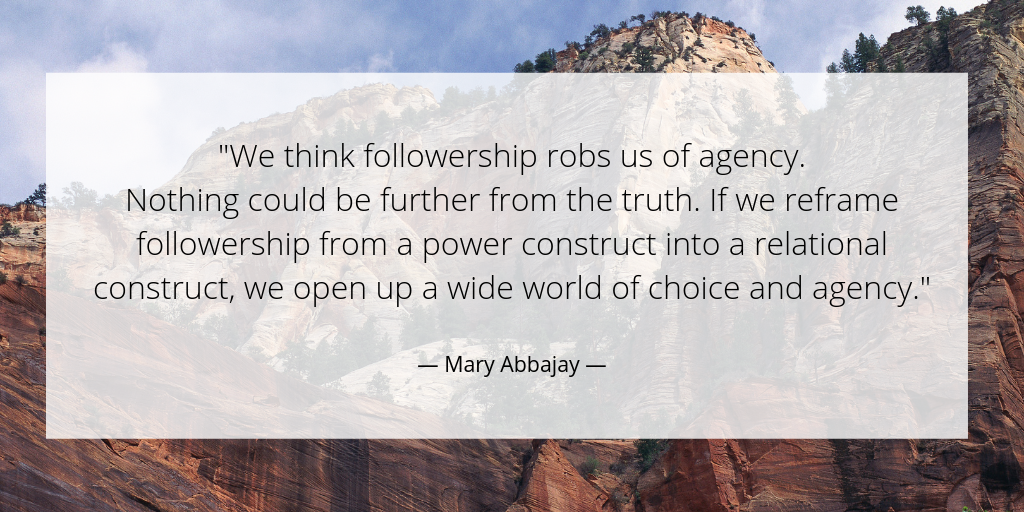Many people think that managing up is only necessary when asking for a raise or negotiating benefits.
That’s not true. We need to normalize the process of managing up. It should not be a last resort. It should be an intentional part of our work from the moment we start our jobs, if not before.
The relationship we have with our supervisors has a direct correlation to our job satisfaction — so much so that 65% of Americans would rather have a new supervisor than a pay raise. Yet, we don’t often work to strengthen our relationships with our supervisors until it’s too late.
I think that a big reason for this is because we’re pretty obsessed with leadership. We spend hundreds of hours teaching leadership skills to ourselves and to our students. Rarely though, do we teach anyone the value of following.
When we minimize the value of being a good follower, we minimize the agency we have in our jobs. It makes it harder to advocate for ourselves, to attempt conflict mediation, and to suggest changes to our work environments.
A lot of people assume that it isn’t their responsibility to maintain a healthy relationship with their supervisor. After all, the duty of supervising is one major reason why higher-level professionals are paid more. But regardless of the power dynamic, it’ still a relationship, and relationships require work from both sides.
Remember: Most managers don’t receive any training on how to be a good supervisor. So, they may not know how to adapt their working style to make their employees’ lives easier, how to handle conflict, or how to delegate appropriately.

Imagine if you swapped roles with your supervisor; how you would wish to be treated by your team?
Working to understand how your supervisor thinks, works, and handles stress will make your life easier and set you up for future career success.
Here are 15 ways you can manage up in your role.
15 Tips
1. Focus on the mission
Some people believe that their job’s mission is to make their supervisor look good. But I would argue that a student affairs professional’s mission is to support students through the lens of your departmental objectives.
After all, if your work is helping the department achieve its goals, you’re defacto making your supervisor look good. So, as long as you can justify your work to your supervisor as being aligned with those goals, they’re more likely to give you the flexibility and trust that you’re looking for.
2. Anticipate your supervisor’s needs
After you’ve worked with someone for a while, you’ll be able to anticipate what sorts of tasks they’ll assign to you.
Try to stay ahead of the game by working on those requests before you’re asked to do them. Not only will your supervisor be grateful, but it’ll also showcase your ability to take initiative.
3. Adapt to their communication style
Does your supervisor not like responding to emails or do they respond far too slowly? Try phoning or texting them… or simply walking into their office. You could also try introducing new communication methods. At Presence, for example, we use and adore Slack.

Be sure to also find out what your supervisor’s love language is and become fluent in it. Have a frank conversation about their preferences and how you can best communicate.
4. Don’t let them get blindsided
If and when you can see a problem looming on the horizon, say something. Or, better yet, fix it!
This is especially important when the relationship is rocky. It might be tempting to let some things fall by the wayside, but ultimately, it will probably reflect more poorly on you than on them.
5. Align your goals
When you need to ask for something, be sure to mention how it will benefit your supervisor and the department — not just you. This will be a lot easier if you’ve already established shared goals.
To start setting individual and departmental goals, I recommend using OKRs. They’re a flexible way of creating SMART goals without committing to specific actions. They are outcome-focused, rather than task-focused.
6. Find the right way to bring up issues
Conflict is an inevitable part of any relationship. So, there will be times when you need to address an issue with your supervisor. Before this happens, be proactive by asking how they would like you to bring things up.
We recently published a post on managing conflict. Top tips include meeting face-to-face in a neutral environment, actively listening, find the underlying emotion, not striving to “win”, and focusing on shared goals.
7. Identify their weakness
What aspects of your supervisor’s management style don’t work well for you? Is it their communication? Their time management? Project management? Once you know what they’re struggling with, you can strategize around it.

For example, if your supervisor is often late to staff meetings, offer to run an opening icebreaker or present a brief report. Or, if they’re super disorganized, suggest a project management tool like AirTable or Asana.
If the solution isn’t something you can independently work on and you don’t want to call them out on their behavior directly, flip the focus to how it would help you do your job better.
So, for example, instead of saying, “You stink at time management,” ask “Can we schedule a regular check-in one week before each event so we can get on the same page about what tasks still need to be completed?”
8. Let them take the credit
You might sometimes feel like no one sees that all the amazing work you do behind the scenes, but that’s okay. You’d be surprised how many people really do know who is doing the hard work.
If you can’t get praise from your supervisor, solicit feedback from colleagues instead. Talk to them about aspects of a project you were nervous about or particularly proud of.
9. Present problems and solutions
Don’t expect your supervisor to have a solution to every problem you present. They may feel pressured (especially if they’re inexperienced) to say or do what they think is the right thing — even if it’s not a wise solution.

So, you should always aim to present some solutions for them to advise you on and, ultimately, help you pick from. Not only will they be more likely to decide on something that you’re mutually excited about, but they will also see you as a more prepared, knowledgeable employee.
10. Look out for their mental health
Express interest in your supervisor’s personal well-being. Just as you would probably want them to acknowledge when you’re having a bad day and are struggling (even if it’s not work-related), they’ll probably appreciate you showing how much you care about them personally.
It doesn’t mean you need to ask invasive or inappropriate personal questions; genuine open-ending questions may be enough.
11. Share your talents
If you have a skill that could benefit your supervisor’s next project, offer to help! Show your enthusiasm — for the benefit of everyone.
You could also use your talents, passions, and skills for solo projects, including ones that are not part of your official job description, to demonstrate your commitment to your work.
12. Gently remind them of deadlines
Accountability goes both ways — especially when you can’t move further with a project until your supervisor does something first. If they have trouble sticking to deadlines or remembering requests, set up a communication plan or project management system to hold them accountable.
Even if this isn’t a frequent problem, try to agree on deadlines ahead of time. Pick a date for final deadlines as well as a time or two for progress checks. It’s important to make behavioral expectations clear ahead of time so that you can both agree if and when your supervisor doesn’t meet them.

13. Communicate your boundaries
Boundaries are so important. You might find yourself trapped in a situation where your supervisor has crossed so far over your boundaries that you don’t know how to reel them back.
So, take some time to identify your boundaries. I suggest writing them down, to serve as a continual reminder to yourself.
Start with affirming statements like “I deserve…” For example, you might write “I deserve to have my private life respected by my job” or “I deserve to not be interrupted whenever someone has a question.”
When it comes to discussing your boundaries, start by asking your supervisor to share theirs’ first. You might say something like “Are you okay with me coming into your office to ask questions or does that cross a boundary for you? Should I wait or email you instead?”
Showing respect to your supervisor’s boundaries will help them feel more obliged to respect yours.
14. Understand the relationships your supervisor has with their supervisor
Your supervisor might be under a lot of pressure from their own supervisor or other higher-up professionals. And that stress might echo out your team.
I’m not suggesting that pushing stress down the organizational hierarchy is appropriate, but it is helpful to at least know the source of their frustration. If it’s possible, try talking to your supervisor about which projects are causing them stress and offer to help them with a task or two that could alleviate it.
You could also refer back to their love language to show that you care. You could buy them a coffee (gifts), tidy up shared space (acts of service), or give them praise (words of affirmation).
15. Coach students
If you have a co-curricular strategy for your students, managing up skills would be a great addition to their career-learning pathway. The NACE’s Career Management competency specifically calls out the skills of navigating work environments and being a self-advocate.
Consider offering a skills workshop on managing up. It could involve helping students to identify their work styles and assess how it complements their peers’ styles. It would also be a good opportunity to discuss how students can seek new opportunities (on-campus or off) or ask for raises.

At some point, you’ll likely get stuck with a weak supervisor. There’s not much you can do to inherently change that.
What you can change is how you deal with it. No, it isn’t fair, but you also don’t deserve to have your career derailed by someone else.
The sooner we start to normalize the skill of managing up, the sooner we can create stronger relationships with our supervisors and be happier and more productive at work.
If there’s an extra tip you have for managing up or if you have a great story about a time you’ve used those skills, we’d love to hear it. Connect with us via Twitter @themoderncampus.
Editor’s Note: Hey reader! We have a new podcast. We thought you might enjoy this episode. To read the transcript and get more resources, head here.




